
Vyasa Puja Birthday Celebration of H.H. Satsvarupa dasa Goswami
Stuyvesant Falls Fire Department upstairs banquet hall 9 Firehouse Ln, Stuyvesant Falls, NY 12174
The Stuyvesant Falls Fire Department is located directly behind the Viraha Bhavan ashram buildings. The parking is the same as you would park when visiting Viraha Bhavan (909 Albany Avenue)
10:00 – 10:30 A.M. Kirtana
10:30 – 11:15 A.M. Presentation by Satsvarupa Maharaja
11:15 – 12:30 P.M. Book Table
12:30 – 1:15 P.M. Arati and kirtana
1:15 — 2:15 P.M. Prasadam Feast
Baladeva Vidyabhusana at [email protected] or (518) 754-1108
Krsna dasi at [email protected] or (518) 822-7636
“I request as many devotees as possible to attend so we can feel the family spirit strongly. I become very satisfied when we are all gathered together.”
******
“In the association of pure devotees, discussion of the pastimes and activities of the Supreme Personality of Godhead is very pleasing and satisfying to the ear and the heart. By cultivating such knowledge one gradually becomes advanced on the path of liberation, and thereafter he is freed, and his attraction becomes fixed. Then real devotion and devotional service begin.”
“The process of advancing in Kṛṣṇa consciousness and devotional service is described here. The first point is that one must seek the association of persons who are Kṛṣṇa conscious and who engage in devotional service. Without such association one cannot make advancement. Simply by theoretical knowledge or study one cannot make any appreciable advancement. One must give up the association of materialistic persons and seek the association of devotees because without the association of devotees one cannot understand the activities of the Lord….. One who has firm faith in the Supreme Personality of Godhead becomes fixed, and his attraction for association with the Lord and the devotees increases. Association with devotees means association with the Lord. The devotee who makes this association develops the consciousness for rendering service to the Lord, and then, being situated in the transcendental position of devotional service, he gradually becomes perfect.”
— Srimad-Bhagavatam 3.25.25, verse and purport
We need to expand our team of proofreaders as we aim to increase the rate of republication of Satsvarūpa Mahārāja’s books as well as new books that he writes.
This includes a need for fluent bilingual Spanish and English speakers to proofread Spanish translations (we currently have around 20 Spanish translations waiting to be proofread).
Anyone interested in this particular service should contact Manohara dāsa at [email protected]
If you would like to help, please contact Kṛṣṇa-bhajana dāsa at [email protected] or [email protected] and we will find you a service that utilizes your talents.
I will sit myself in a chair and before candlelight, finger the beads. I know the mind will go its own way. Not much I can do about that, but go on chanting and bring it back under control of the higher self, name, holy name.
******
It’s like a choo-choo train,
the holy name
uttered by me
to set me free
from maya ‘s grip.
It’s like nothing you can say,
frees you from the fray,
I am the way and the life
as Jesus said.
So chant Krsna’s name
and don’t do it for fame.
Got to go and chant now
no other way. Tell yourself, be good
chant in your hood,
the Hare Krsna monk
go to the bank and deposit
this greatest asset.
(Or beg for it—pure chanting)
Mind, mind, you plan your games,
what gain in that?
I ask you to cooperate
and allow the names to gently fill my being,
and heart and head
******
Nothing more to say, is there? You just chant and chant as much as you can and there’s not much time left beyond that.
******
Conduct yourself through the day-long vrata to chant and chant. All else gets put aside. Manu said, “I didn’t think this (only chanting) is not what I should be doing, but I really thought this is defmitely what I should be doing.” A week devoted to full japa increase. Hare Krsna Hare Krsna.
******
I chant slow rounds mostly because of the little breath intake I make between each mantra. And also I don’t rush it. So going faster may help concentration. Hear and chant. There is no dramatic breakthrough. The offensive chanter cannot taste the nectar of the Lord’s holy name.
******
The sastra tells us even inattentive chanting removes miseries. Even if mishaps come, by chanting you don’t suffer; you savor the Lord’s nearness and protection, you enter the spiritual realm of no anxiety. There are so many secrets to the holy name and you can’t uncover them all.
******
Memories of old pre-Krsna conscious days in this life, and figments of daydream fantasies pop up as I chant along. Don’t have to give them so much time or credence or put them into writing. Come back to now chanting. You don’t have to wrench yourself away from a memory of your father’s good (or wrong) intentions to you. But if it’s illicit sex—that I want to depart from quickly.
******
Flow in direction back to mantras. Learn a device of returning to chanting.
******
I haven’t yet begun to invest my thinking and feeling in it in any prayerful way. Hare Krsna Hare Krsna.
The Lord,
the Lord
the Lord is in His names.
pp. 22-25
SDG singing and clapping:
hare krsna hare krsna, krsna krsna hare hare
hare rama hare rama, rama rama hare hare
I was just reading a Srimad-Bhagavatam lecture by Prabhupada in Vrndavana, 1972. It was on the verse:
naṣṭa-prāyeṣv abhadreṣu
nityaṁ bhāgavata-sevayā
bhagavaty uttama-śloke
bhaktir bhavati naiṣṭhikī (SB 1.2.18)
Prabhupada was talking about the Bank American card and how people work so hard to maintain anarthas. He was explaining the word “anartha” and how hearing the Bhagavatam removes anarthas. Anarthas are things that are unnecessary. He included in it much of what we consider civilized life—consumerism and heavy sense gratification. If we take to Krsna consciousness, sense gratification and its resultant entanglements get removed. He went over the four prohibited activities and how a devotee stops them—illicit sex, intoxication, etc.
He was doing a bit of transcendental boasting, you could say, that his followers have achieved this freedom from sense gratification. l had two quick impressions. One was that it was true about me. As I said, as soon as I took to Krsna consciousness, I gave up intoxication and illicit sex.
That’s as significant a confirmation as I can make as a devotee, for myself and for preaching to others. Let’s not forget that in this age, where there is sometimes doubt whether Prabhupada’s boasts about his disciples are true and whether the Krsna consciousness movement is measuring up to the optimistic vision he had for it. I’m an example.
The other thing I thought about was when Prabhupada was speaking about anarthas, I realized that so many devotees have left th Krsna consciousness movement. Our movement is no longer unified the way it was when Prabhupada was physically present. It’s no longe growing like wildfire. Still, we have to go on. Times have changed. There are new difficulties, but we have to prove ourselves sincere devotees of Srila Prabhupada.
On this tape, Prabhupada said that even if all our bad habits aren’t immediately removed—they may come back by accident—we’re still devotees because of our conviction in Krsna consciousness. Api cet sudaracaro. Then he said that if we deliberately commit sinful activity, we’re not devotees.
Anarthas are cleared by regularly hearing Srimad-Bhagavatam. Although someone may say, “But Krsna is not personally here speaking the Bhagavatam,” Prabhupada answered that doubt. He said we can hear from Krsna’s words and Krsna’s representatives. Krsna’s words are absolute when they are repeated in parampara—nityam bhagavata sevaya. They’ll remove the dirty things from the heart.
And what are those dirty things? They are sense gratification and the desire for sense gratification. Those things force us to take birth after birth. They can be washed away, “reduced almost to nil.” The devotee continues on the safe path, hearing and chanting and giving up sinful activities until he’s ready to go back to Godhead. If he falls away from the path, Krsna will ensure that he can again take up the path of Krsna consciousness at some time.
******
SDG singing and clapping:
hare krsna hare krsna, krsna krsna hare hare
hare rama hare rama, rama rama hare hare
How am I doing? I ask myself that while I chant Hare Krsna. Maybe a devotee is supposed to be what I am. Maybe it’s rare that a person can get more taste in Krsna consciousness. But why does Prabhupada speak of an advanced state if we’re not meant to attain it? Where does Prabhupada expect us to be at now? Usually, whenever devotees tried to explain to Prabhupada that their chanting was inattentive, he would console them. He told them to go on chanting anyway and not to be inattentive. Utsāhān niścayād dhairyāt —be patient, enthusiastic, and have confidence. Don’t get depressed. That’s how Prabhupada encouraged us.
That makes me think that I’m backward, that I really should be doing a lot better, that I’m a slow student. Prabhupada encourages me anyway. His encouragement doesn’t mean that I’m doing all right. Maybe I’m not doing all right, but there’s no other recourse except to go on.
We have faith that the spiritual master accepts us as we are. We are who we are. If we can’t make some quantum leap forward right away, then what can an encourager say to us except to tell us to stick to the process?
But is there no other alternative but to go on with our slovenly mental habits while chanting? With the bare sixteen minimum while each round is going on, we think only of the count. The maha-mantra is only a kind of muzak piped in as a background hymn to our acts and thoughts. No, that’s not what the verse says. It says harer nama harer nama harer nama, in the age of Kali, there’s no other way but to chant and to chant and to chant. There is an alternative to our bad habits, and it’s up to us to pray for it.
But I can’t pray. Did I ever pray? Was I praying in the Pyrennes that time? Something was going on. I want those prayers.
pp. 61-64
A boy with a stick is rounding up the goat and kid. But they are not inclined to follow. They want to eat grass wherever they like.
What is the idea of this writing? It is to keep going with anything that comes. Pay attention to it and what comes to the mind.
Plastic clothespins (pink, light blue, and yellow) on the brick wall. The mosquito net on the roof sways in the wind like an Aghasura demon in a gurukula skit. Mothers with babies—or are they carrying something else? Pots?—I can’t see far enough to distinguish what they are carrying.
Baladeva suggests I keep an exercise book for trying my hand at the language and metaphor of rasika poetry. “As a sort of literary exercise to help the consciousness absorb the mellows. Something like those notebooks you kept on Hare Krsna mantra writing. You could practice repeating the nectarean descriptions you have heard as they flow into your mind.” This idea appeals to me, because I have never found a way to write at all like the rasacaryas. I seemed “doomed” to my American prose. I am looking for a suitable notebook to try this. But let me do the first exercise here.
The cataka bird lives only on the rain that falls from a certain monsoon cloud and won’t accept other water. Rasika devotees will starve rather than ingest any literature that doesn’t describe Radha-Krsna’s pastimes.
The cakora birds drink only beams of moonlight. They wait for the moon to rise.
Krsna is the taster of mellows. He also tests the gopis. As a goldsmith tests the value of gold by scratching it, Krsna tests each of the millions of gopis participating with Him in the rasa dance. He discovers that Srimati Radharani alone satisfies Him.
The red lac from Her feet rubs off on His chest. The red kunkum from Her breasts rubs off on His feet, and as He walks in the dewy morning, transforms the land of Vrndavana into rasa.
The beauty of the forms of Radha and Krsna defeat, shame and embarrass the beauty of all forms of Nature. Kamadeva is pained by Krsna’s youthful pose when He stands with His flute. Radha’s thighs put the beauty of banana tree trunks to shame. Krsna’s arms are “coming to peace talks” with big bolts of doors.
I can go on recalling and collecting like that as an exercise. I do it with faith in what I repeat and appreciating the tasty manner in which they express kunja-vilasa. I hope to become addicted to hearing the actual pastimes straight from the source.
Why do I write? I write because there is sweat on my upper lip. Because I came here to do it. I write because I learned how to do it in college. It is a way I have chosen. If I don’t write, I won’t collect pages.
I write because there is an old woman in a faded sari slowly walking across the field and I want to tell you about it. I write to chase blues, to race ahead of my agitated mind and not dwell on sex desire. I write to chase the flies. I write because Prabhupada told me to.
I write because we came to Vrndavana and I am always saying this is the best place to write. There is a bamboo-supported tent up here to protect me from the sun, just so I can write.
I write because we have typists and Baladeva and Kaisori and Madhu and everybody, even my high school English teacher, and the dictionary—and what would I do if I didn’t write?
I write to join the elite order of eternal Vaisnavas. I write in hopes that Krsna will say, “All right, give him some mercy. Let his writing improve and be filled with rasa.” I write to explain myself and to do honest work. I write to serve readers. I write to do something crucial during the crucial hours of the day. When I don’t write, I think, “That time could have been spent writing.” (I felt that way yesterday. We were alone in a room for fifteen minutes waiting. I could have written there, but I was trying to subdue a headache.)
I write to use precious health and life duration. After I die, something will be left behind. They will say, “He wrote many books like Bhaktivinoda Thakura. Not like Bhaktivinoda Thakura, but for ordinary strugglers like himself.”
pp. 57-61
Book bogged. Because no more time. You have to answer letters and prepare two more lectures. Sunday mornings they read from Caitanya-caritamrta and its Siksastakam, Chapter Twenty of Antya-lila. It’s namnam akari bahudha. So, prepare for that – I commit offenses and therefore I do not have a taste for chanting. I have experience of that.
Sunday afternoon is the feast crowd lecture. Jaya Govinda says seventy-five percent of the audience is well-acquainted with basic Krishna conscious philosophy. I thought of a talk on Srila Prabhupada. How, stories? One for each of the twenty-six qualities of a Vaishnava? I’d like to praise him but not just defeat others, not for sake of gung-ho ISKCON loyalty. Out of my own spontaneous remembrance. Is that possible?
Floating. Groggy. Must write. Don’t see new land, Captain.
Development of amour
That’s the thing we’d like
but you can’t expect it
so easy.
He used to be…I remember
in our little life and
since this is Prabhupada-
desa, they want me to
talk of him how
he’s merciful, gave me a
bowl of dal, I phoned
him from the office
but I feel they’re too sentimental
or they stick in my throat,
hagiography, tell some story.
One helps you to another.
It’s an ever-fresh. Go to another
peak. Lordy…
developing to love comes from
hard work when He
rewards you.
Yes, yes, I’ll be stuttering
and then falling into
general, “the guru” like to
see you fall on your face a
few times
and get up and talk on Prabhupada
a better story.
Development of love finds its
satisfaction in the effort
blood, stumble.
Not even rehearsal can do it but willingness and you do have memories and they want to hear them, why not take a chance, yes, I’m willing.
He said yes Steve come over and
I’ll look into his face, my
master he was stern –
list the stories if you want:
– stern face after giving him money
– no to Chinese and yoga
– with him late at night
walk? My, my,
he accepted all you boys and
girls and pushed on Lord Caitanya’s
movement despite little cooperation
even with his Godbrothers he was
Lord’s great
devotee
to whom we give our
parts and that’s all I
really care about/
the fact I guess I’m here and want
to serve him and do find limits in my
present condition
it would be a risk
to advertise I’ll
speak on Prabhupada
and improvise
for fear
I’ll fall to
minimize in any way
or show my confusion.
They want huzzahs, human portraits I can give and specialize in, if you don’t mind.
They’ll take it, these people and you’ll see new hope/the person whom you want to win will rise like a rock precipice from the ocean
Prepared…
The namnam akari verse (Siksastikam number two) is “my” verse. I theoretically believe and even teach that the holy names are fully infested with God’s potencies. But because of my offenses I am not able to pay attention to or taste the nectar of the holy names.
If I truly felt this, it might plunge me into remorse and humility which is expressed in trnad api sunicena. You call out to Krishna to pick you up from the ocean of death and allow you to serve Him by chanting. Yes, I can speak something on this topic.
We all desire to chant better and we’re committed to it. We don’t want to think our main method of meditation is ineffective.
O Lord, kindly
appear in Your names.
Me and Jaya Govinda walked around the ISKCON property, cows, oxen but not really working or producing, mostly unattended agricultural fields, a pretty garden area built by the monks who use this place as a twice-a-year retreat. Retreat, go forward, seek God…
Tents and campers, women devotees and their men. An older man sitting on a chair chanting japa. It’s sunny Italy near my bedtime.
Oh, the torches doth
glow “on what basis”
do you trust the process?
Is it something I can’t understand
because my faith is too
tender?
I say nothing but yukta-
vairagya – it digs out the
truth.
I learned it and
use it.
Krishna barflies, wasps
dropping all under
His will, material and
spiritual and in between
you may get bitten
by mosquitoes tonight, so see
it as His mercy when you scratch blood
it was a good extra japa round
to walk outdoors
see the distant Catholic church and the
corn rows and my shoes were walking easy.
pp. 4-7
Carrying the body around, piss it, clean it, dress it, struggle to put the wristwatch on, the stockings over cracked toenails, huffing and puffing with a fast-beating heart. Wake the Deities, take Them out of Their beds, wash your eyeglasses—is it time for japa? Where is your dissatisfied mind going?
Uddhava continues to describe Kṛṣṇa’s pastimes after He left Vṛndāvana. Śrīla Prabhupāda reminds us that because these pastimes are elaborately described in the Tenth Canto, they’re only briefly described in Uddhava’s talks with Vidura. But these mini-portraits are very charming and attractive by themselves.
Uddhava tells about King Kaṁsa’s death at the hands of Lord Kṛṣṇa and Baladeva in the arena of the wrestlers. When Kṛṣṇa attacked Kaṁsa on the throne, His parents feared that now Kaṁsa would finally kill their sons, whom they had hidden for so long in the house of Nanda Mahārāja. In the mood of parental affection, they felt extreme danger, and almost fainted. “Just to convince them that He had actually killed Kaṁsa, Kṛṣṇa and Baladeva pulled Kaṁsa’s dead body along the ground to encourage them” (SB 3.3.1, purport). Uddhava next tells how Kṛṣṇa went to the gurukula of Sāndīpani Muni and learned all the Vedas simply by hearing them once from His teacher. And He rewarded His teacher by bringing back his dead son from the region of Yamarāja. Prabhupāda reminds us that no one but the Supreme Lord can become well versed in all the branches of Vedic wisdom by hearing them only once from his teacher. Nor can anyone bring a dead body back to life after the soul has already gone. But Kṛṣṇa went to the planet of Yamarāja, found the dead son of His teacher, and brought him back to his father as a reward for the instructions He received. Kṛṣṇa already knows all the Vedas, but just to show that everyone should go to gurukula and learn from an authorized teacher and satisfy the teacher by guru-dakṣiṇā, He Himself adopted the system. When He asked Sāndīpani Muni what he wanted, the teacher asked for something that was impossible to be done by anyone else. He asked that his dead son be brought back, and the Lord fulfilled the request.
“The Lord is not, therefore, an ingrate to anyone who renders Him some sort of service. The devotees of the Lord who always engage in His loving service are never to be disappointed in the progressive march of devotional service” (SB 3.3.2, purport).
Uddhava told Vidura about Kṛṣṇa’s kidnapping Rukmiṇī despite the fact that she was already promised to marry Śiśupāla by the desire of her brother. Rukmiṇī implored Kṛṣṇa by letter to take her away from Śiśupāla, so when Śiśupāla came there with his party with the plan to marry her, Kṛṣṇa all of a sudden appeared and swept her away right before the assembled princes. The father of Princess Nāgnijitī stated that whoever could subdue seven bulls whose noses were not pierced could have the hand of his daughter in marriage. The Supreme Lord achieved the hand of Princess Nāgnijitī in the open competition. But although He was victorious, His competitors asked for the hand of the princess, and thus there was a fight. “Well equipped with weapons, the Lord killed or wounded all of them, but He was not hurt Himself” (SB 3.3.4).
“The Lord once went to the heavenly planet to present an earring to Aditi, the mother of the demigods, and His wife Satyabhāmā also went with Him. There is a special flowering tree called the pārijāta, which grows only in the heavenly planets, and Satyabhāmā wanted this tree” (SB 3.3.5, purport).
The pen leads the way. Incongruous thoughts. Watermelon snack: “Oh Lord, this material body is a lump of ignorance . . . But Kṛṣṇa is very kind to us. He has given us this nice prasādam just to control the tongue. Now let us take this prasādam to our full satisfaction and glorify Their Lordships Śrī Śrī Rādhā and Kṛṣṇa and in love call upon Lord Caitanya and Prabhu Nityānanda to please help us.” Then you taste the sweet red core of the watermelon. Don’t forget Śrī Śrī Rādhā and Kṛṣṇa and Lord Caitanya and Prabhu Nityānanda. They should be there in every bite. Not that you recite the prayer and then pig out.
Loop your letters. Make them clear as possible. Let them tell about Kṛṣṇa, who took the pārijāta tree from heaven, who married all the girls kidnapped by Narakāsura, who brought back from the dead the son of His teacher, Sāndīpani Muni, who subdued the seven bulls to marry Princess Nāgnijitī.
Free write runs right. Avoid the commercials. We are getting a new (used) Honda van to travel to Gītā Nagarī and other Kṛṣṇa conscious places. It was donated by Śacī-suta. Avoid wrong turns, using the van for going into māyā.
Free write runs clean. See the pond with the fountain gushing up from the center. Steps around the workmen on the tall ladder hammering shingles onto a neighbor’s roof. Takes a walk by himself along the pathway surrounded by a white fence. His feet scuff along the pavement because he can’t walk properly. The walk is a kind of daily dharmic duty. Like lifting the dumbbells.
I do some things, think some things I don’t put into free write. Call it editing out the gross, the inevitable errant of this old man. Why should I tell you my naughties, my bad dreams?
Meanwhile the grass grows and is mown by suburban workmen. They culture flowerbeds in the Five Points Village, where we live. “As American as apple pie,” says Bala. He’s gone today in hopes of picking up the Honda. 6:21 P.M. Time to wind up this free write and say your gāyatrīs.
pp. 213-215
My dear Lord Krsna…
I pray that You will always give me the opportunity and intelligence to serve You. The first-class service to You is to be among Your eternal associates in Your spiritual abode, Goloka Vrndavana. There, one serves You in Your form as the original person, the cowherd boy, Syamasundara. Equally good, although different, is to be among Your eternal parisads (associates) in Navadvipa, where You manifest as Lord Caitanya and engage in the sankirtana (congregational chanting) of Your holy names. If one is not qualified to serve You in the spiritual world, he can serve You in separation in the material world. Service in separation, when done in full surrender and fervor, is just as potent as service in union with You. Service in direct union with You is called sambhoga, and service in separation is vipralambha seva. Even in the spiritual world, Your devotees sometimes serve You in separation. The gopis, or cowherd damsels of Vrndavana, had many pastimes with You in direct union. The most famous is the rasa dance, where the gopis danced with You in the evening in the Vrndavana woods. But when You were sixteen years old, You left Vrndavana for Mathura and did not return for many years. The gopés apparently suffered painfully in separation from You. But in actuality, when You were not present, the gopés meditated on their pastimes with You and felt Your presence more intensely than when You were actually present. Paradoxically, Your absence produced a higher ecstasy for the gopis than Your presence. Lord Caitanya appeared in this world for the confidential reason of experiencing vipralambha seva, Radharani’s mood of ecstasy in separation from You. His followers, the Six Gosvamis of Vrndavana, also cultivated vipralambha seva and always remained unrequited in their search for You. They would cry out, “Where is Krsna? Where is Radha? Are They on Govardhana Hill? Are They at Radha-kunda?” They would remain in the mood of searching for You without finding You. The spiritual masters in the Gaudiya Vaisnava sampradaya teach their disciples to cultivate vipralambha seva and consider it the highest spiritual ecstasy.
But whether one cultivates service in separation or service in union with You, it is the quality of the service that counts. We are taught to serve You for Your pleasure, not our own sense gratification. A sincere devotee wants to please You. The gopés felt pain when You were away because they thought You would be unhappy without them. When they are together in the rasa dance, the gopis try to please Your senses. The disciple tries to serve the spiritual master so that he will please his spiritual master, which they know is their Guru Maharaja’s topmost desire.
I know that You are atmarama, fully self-satisfied, so how can I please You by my service? You are self-satisfied, but You want to see me serve You to please Your senses. You know that will make me happy. You want me to return to You and be happy, and You know that only by serving Your senses can I be fulfilled. It sounds a little complicated, but it is very simple. The example has been given of the stomach and the bodily parts. The bodily parts can be satisfied only when they put food in the mouth to go into the stomach. From the stomach, the energy of the food will be distributed to all the bodily parts. If the hand tries to enjoy the food by itself, the process will be spoiled. The hand has to deliver the food to the stomach, and then the hand will be benefited.
I want to grasp the simple dynamics of service to You and perform my service intelligently. I want to chant to please You, I want to write to please You, I want to teach to please You. Whether in union or in separation, I want to serve to please You. Please help me to remove selfish motives in my service. Let me not serve You for spiritual sense gratification. Please help me to remember the examples to direct me to serve You for Your pleasure. Then my pleasure will come automatically. You are the Lord, and I am Your servant; let it always be so.
pp. 10-13
Here I am, taking another lick on the same day. Looked at a few more of my poems in the new published collection. They seem slight. But when I look at other poems by published poets, they are also like that. What stands up? They have some reality … some truth, a flickering. At least I know something went into them, some reference that cost me, like me saying in a future life I may get free from passport worries. But . . . slight. You could rework poems, print less, but then it finally gets down to not trying at all. You try, and part of it is when you publish. If a reader was very sensitive, he could pick up that there was really something there; but it is unfinished. It requires a lot of sympathy from the reader, to bend forward to the poems. But as I say, I find the same thing in almost any poem I read. We expect so much…
Reddish orange rim on top of
the tree-topped horizon, burnt blue,
burnt orange, it’s very close to night,
a beautiful time of winter, sunny day.
And we are quiet in this house. I spoke
a little with M. about what I’d read
in Merton’s biography of him and the girl.
M. said
he’s glad I’m afraid of it. Women after men
with power. Behind every great man there is
a greater woman, etc.
Orange reddish rim . . .
Now tomorrow starts the seminar, but it appears not well-organized. They say not so many will attend. I have got my writing course lined up. I’ll tell them, “Okay, now we are going to write. What are some writing blocks you think you’ll meet?” I’ll ask them to write down the blocks and then, “Go ahead,” I’ll say, “don’t be bashful. I’ll keep it anonymous. Go ahead.” They will start—most of them never write, so it will be rusty. I’ll write along with them, have fun with it, and respond to the Gita? verse where Lord Krsna is speaking to us. That’s the idea. I don’t care if only a few come to my class. Better that way, less papers to read.
This winter in peaceful land. And in between the times of going back and forth to the temple, maybe you can speak here. Main point is to try to go further than what you’ve done regarding the truth in poems. Because if you try to make them ideal or any kind of pose, pose of honesty, etc., it shows, it is weak, it doesn’t come across strongly.
I prefer non-bombast, quiet look but very much the real thing that you experience without pretense. The more you can do that the better. Otherwise, what is the use of printing poems, just to say I did some more?
Now no red,
all darkest blue, indigo spider-branched trees,
no meteor shower I don’t think I’ll even look
for it they say the peak is over,
the spectacular shower of stars coming down
all over the earth and we are praying
Hare Krsna,
that’s it, you haven’t prayed
and that’s why your poems mostly consist of
the thin admittance,
“I couldn’t do it, didn’t do it,
Writing seminar, classroom notes;
O Krsna, they are writing in my writing course so I have got my stopwatch out. Ain’t it nice? Don’t forget them. Care for them. Writing is a gas, carefree thing and leads us to Krsna. I want them to like it. And to like me!
The first assignment is a bit fuzzy.
I ask them if they ever saw Krsna in someone’s heart.
It’s a good question, actually.
Did I question? No! I can’t think. Let it rip. Go, go.
I did once I saw a yo-yo
What do you mean?
Prabhupada, I thought, was God
for me.
Yeah. And what else?
What are they writing? I look at them, heads down, writing with pens. And me gloating, the leader, the instructor, bighead.
God in heart of stranger
I don’t see Visnu
but assume that holiness is there.
Treat people kindly.
Prabhupada says it and I believe it. Yeah, that’s
it for me—he says it.
Dear Krsna, I don’t see it but believe it .
People and life is sacred.
God is there. You don’t see it in
ruffians but in innocent or sacred, advanced persons.
Or when someone is making
a holy exchange with you.
I saw God in
a walrus.
I saw God in a plantain.
I never saw the face of God
but do sense He is there.
Gatti says so
a beautiful concept.
The yogi sees.I meet someone who does
see God in others.
Like that.
Next assignment was based on Bg. 6.47. I have lived in the Deities . . . I have served the Deity . . . I have felt intimate relationship…
These pious devotees are writing their realizations.
pp. 68-71
It’s a nice time of day. Late sunlight is slanting into your room, Srila Prabhupada, reflecting through the leaves. There is a sporadic procession of visitors this afternoon. The monkeys are screeching in your garden. Did they used to intrude and screech when you were here? Of course, we know how they took your slipper and interrupted your lectures at Radha-Damodara.
I spent a mere ten minutes with your books today and then started a reading log. I want to build up the discipline again. My reading schedule has been depleted, but I’m not without hope that I can institute a reading reform in my life. Without reading your books, these visits to your rooms may be a bit hypocritical or sentimental. At least they are incomplete without the substantial darsana of submissive and alert reading.
Prabhupada, the temple president here said about my Radhastami lecture, “It was fantastic. Satsvarupa Maharaja at his best, in the mode of empowered Lilamrta.” I’m at my best and can satisfy the devotees best when I make inspired presentations of Your Divine Grace’s life. I seem to be useful in that way. My intentions, my personal campaign of “Back to Prabhupada” is not just a selfish thing; it will make me a pleasing and effective preacher.
I can relax in your room. I sit in the back, distant yet close. This is all the intensity I can take these days. The devotees are assembling out front for a Sunday afternoon harinama party into Vrndavana, but I don’t feel up to it. No one else is here in your room. You might be sitting here and I’m here with you as your servant and disciple, telling you, “Srila Prabhupada, they’re going on harinama. Can I get you a drink? Any prasadam you would like?” It’s Ekadasi and you might not want anything, but if you do, I can arrange for it.
As I write, I’m brought back out of the past to 1993. I look out the window and see two bhaktas from Russia, both named Alex, who want to take initiation from me. They would like to meet with me, but I avoid meetings. What do you think, Srila Prabhupada, of me initiating them and others? Should I stop, or is it my duty? One thing is clear: my only credential for initiating is my bona fide link to you. Today, so many people wanted to attend the meeting for my disciples that they couldn’t fit into the room. I have never even seen some of them before. Later I thought, “Why would anyone consider me a spiritual master?” The only answer is my connection to you.
Initiating disciples is a duty I perform for you. It is how I sacrifice myself and serve your movement, but I’m not always sure, and that’s one of the important items I’d like to hear from you about. I say “hear” from you, but I don’t expect a letter from the spiritual world or to hear your voice from the sky. If you could enlighten my intelligence so that I could know what you want . . . For now, I initiate only on an exceptional basis, a few a year.
Many of the ones I initiated over ten years ago have gone defunct.
ask you about initiations, but let me also admit to you my inattentive japa. Please give me your mercy. Please help me. I could ask you for direction, but what more can you say? You have already said so much. Chant and hear. Serve the guru and the taste for chanting will come. Control the mind, the stubborn mind.
The sun is going down. Your last days and weeks in 1977 slipped away. The bell rang. You laid in bed and didn’t eat. Your body gradually stopped functioning. Long hours of silence. Chanting by your bedside. Young men at your bedside, eager to serve you, and very attached to their preaching zones and assignments in various places around the world. You trained us like that, to be dedicated to a temple or a service. When we came to see you, after a week or two we were restless to return to our prabhu-datta-desas. Partly we wanted to be little lords in our zones, but the good result was that we wanted to fight on the battlefield as you ordered—to distribute books and to preach, to change the world into a Krsna conscious place.
You didn’t like us staying in Vrndavana with no real engagement. You wanted us to get out and preach, to go back to our field. I remember these things about you, Srila Prabhupada.
pp. 52-54
Giriraja dasa had been serving Srila Prabhupada in Bombay for quite a few years when he finally returned for a visit to the United States to recover his health and to see his parents in Chicago. When he returned again to Bombay, Prabhupada inquired about his health and his visit to his parents’ home.
Giriraja described how during the two-day visit with his family, his father had invited a friend, who was a psychologist, to have a talk with Giriraja. The psychologist, a woman, had begun asking Giriraja whether he felt that in his childhood there was any lack in his relationship with his parents. Giriraja had replied on the basis of Bhagavad-gita, that actually each of us had passed through many bodies in many different lifetimes, and in each lifetime we had different parents, but our real father is Krsna. The psychologist had kept trying to speak to him on the psychological level, but Giriraja had kept replying to her on the spiritual platform, so it was very difficult for her to make progress in her analysis. After she left the room, Giriraja had overheard her speaking to his parents in the hallway, saying that as far as she could see, there was nothing more she could do.
“Yes,” Prabhupada replied, “they called her so that she could try to cure you, but actually your disease is incurable. You can never go back.” Hearing these words from his spiritual master, Giriraja became engladdened.
An elderly Indian gentleman who visited Prabhupada in his room became gradually critical of Srila Prabhupada’s preaching.
“Swamiji,” the man said, “you should not criticize so many persons. You should see everyone equally. The Bhagavad-gita says, pandita sama-darsinah: you should see everybody equally.”
Prabhupada replied, “That is a higher stage. I am not on that stage. I distinguish. On the higher stage you don’t distinguish between pious activity and sinful activity. But I distinguish. I say, ‘You are sinning comma and you should stop.’”
As the discussion continued, Prabhupada kept referring to the previous acaryas in order to support his viewpoint. “I have my Bhagavad-gita,” said Prabhupada. “I have my acaryas. I stand on their authority.”
Pursuing the argument, Prabhupada’s visitor said, “What have you done beyond that? You are just repeating what they’ve done. What have you done?”
Prabhupada replied, “I’ve not done anything. I’m simply repeating. So my contribution is that I have made this knowledge available to people all over the world. Without discrimination, I have given Krsna consciousness to everyone. That is my contribution and that is my version of pandita sama-darsinah.” Prabhupada concluded the interview with those words, and the man expressed gratefulness.
Later in the hall, while leaving, the man was remarking out loud to himself, “Very interesting … He sees everyone equally … ”
Bhavananda Goswami had been a professional decorator before meeting Srila Prabhupada, so Prabhupada engaged him in that propensity by asking him to decorate the altar for the first Radha-Krsna Deities in America. Bhavananda had just completed his work and was bowing down before the forms of Radha and Krsna when Srila Prabhupada entered the room.
“Oh, very nice,” Prabhupada said. “Who has done this?” “I have, Srila Prabhupada,” Bhavananda replied.
“Yes,” said Srila Prabhupada, “you can decorate the naked dancing club and go to hell, or you can decorate the temple and go back to Vaikuntha.”
When Srila Prabhupada stayed in Los Angeles, a two-year-old boy named Bhakta Visvareta became very attached to him, and Prabhupada showed him special mercy. Bhakta Visvareta used to crawl up the stairs and into Prabhupada’s room without knocking. He would sit with his back straight before Prabhupada, and when Prabhupada gave him some prasadam, he would not eat it until Prabhupada asked him to do so. Prabhupada was very pleased that at such a young age, the boy could chant japa, recite verses, and sing and dance in kirtana. When Bhakta Visvareta was five years old, Prabhupada asked his parents to send him to the gurukula in Dallas. Then one time when Prabhupada visited Dallas, he again met with Bhakta Visvareta, and it was like the reunion of two old friends.
Yet this time, Bhakta Visvareta was extremely shy. He wouldn’t bow down or say or do anything in Prabhupada’s presence. He just stood there looking down. Prabhupada began to pinch him in several places and tugged at his sikha, but the boy wouldn’t respond. Then Prabhupada finally asked him whether he would like a sweetball. Bhakta Visvareta nodded his head yes. Prabhupada had his servant get one, and they gave it to him. When he took it and immediately ate it, Prabhupada smiled and said, “Ah, he is a devotee of prasadam.”
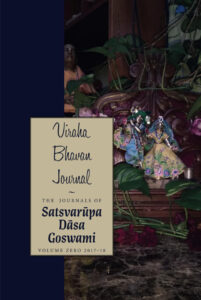
Viraha Bhavan Journal (2017–2018) was written by Satsvarūpa Mahārāja following a brief hiatus in writing activity, and was originally intended to be volume 1 in a series of published journals. However, following its completion and publication, Mahārāja again stopped writing books, subsequently focusing only on what became his current online journal, which began in August of 2018.
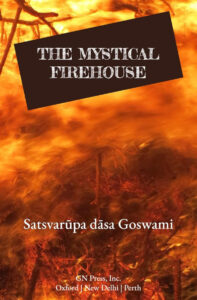
At first, I took it hard that I would have to live surrounded by the firemen, and without my own solitude. After all, for decades I had lived in my own house with my own books and my own friends. I was also now a crippled person who couldn’t walk, living among men who did active duties. But when Baladeva explained it to me, how it was not so bad living continually with other firemen and living in the firehouse with its limited facilities, I came to partially accept it and to accept the other men. I came to accept my new situation. I would live continually in the firehouse and mostly not go outside. I would not lead such a solitary life but associate with the other firemen.
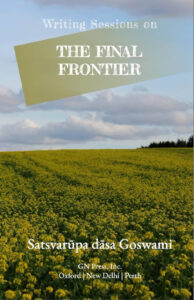
Let me write sweet prose.
Let me write not for my own benefit
but for the pleasure of Their Lordships.
Let me please Kṛṣṇa,
that’s my only wish.
May Kṛṣṇa be pleased with me,
that’s my only hope and desire.
May Kṛṣṇa give me His blessings:
Kṛṣṇa Kṛṣṇa Kṛṣṇa Kṛṣṇa Kṛṣṇa he
Rāma Rāghava Rāma Rāghava
Rāma Rāghava rakṣa mām.
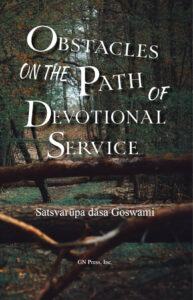
You mentioned that your pathway has become filled with stumbling blocks, but there are no stumbling blocks. I can kick out all those stumbling blocks immediately, provided you accept my guidance. With one stroke of my kick, I can kick out all stumbling blocks. —Letter by Śrīla Prabhupāda, December 9, 1972.
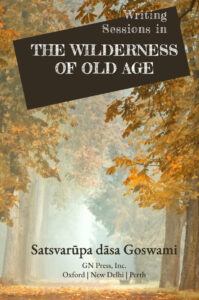
The Writing Sessions are my heart and soul. I’m trying my best to keep up with them. I am working with a few devotees, and they are far ahead of me. I wander in the wilderness of old age. I make my Writing Sessions as best I can. Every day I try to come up with a new subject. Today I am thinking of my parents. But I don’t think of them deeply. They are long gone from my life. Śrīla Prabhupāda wrote a poem when he was a sannyāsī, and he said now all my friends and relatives are gone. They are just a list of names now. I am like that too. I am a sannyāsī with a few friends. I love the books of Śrīla Prabhupāda. I try to keep up with them. I read as much as I can and then listen to his bhajanas.
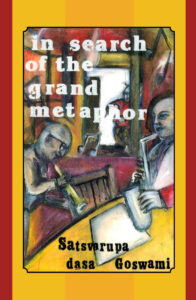
The metaphor is song. Explain it. Yes, particulars may not seem interesting or profound to readers who want structured books.
Wait a minute. Don’t pander to readers or concepts of Art. But Kṛṣṇa conscious criteria are important and must be followed. So, if your little splayed-out life-thoughts are all Kṛṣṇa conscious, then it’s no problem.
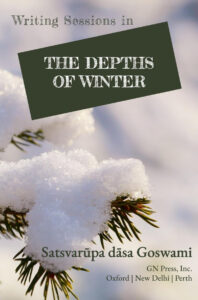
I am near the end of my days. But I do like the company of like-minded souls, especially those who are Kṛṣṇa conscious. Yes! I am prone to Kṛṣṇa consciousness. I have been a disciple of Bhaktivedanta Swami Prabhupāda for maybe almost sixty years. Sometimes I fail him. But I always bounce back and fall at his feet. It is a terrible thing that I sometimes do not have the highest love for him. It is a terrible thing. Actually, however, I never fall away from him. He always comes and catches me and brings me back to his loving arms.

This edition of Satsvarūpa dāsa Goswami’s 1996 timed book, Upstate: Room to Write, is published as part of a legacy project to restore Satsvarūpa Mahārāja’s writings to ‘in print’ status and make them globally available for current and future readers.
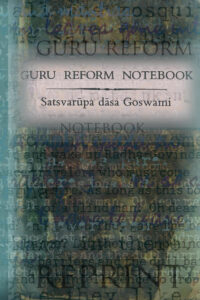
A factual record of the reform and change in ISKCON guru system of mid ’80s.
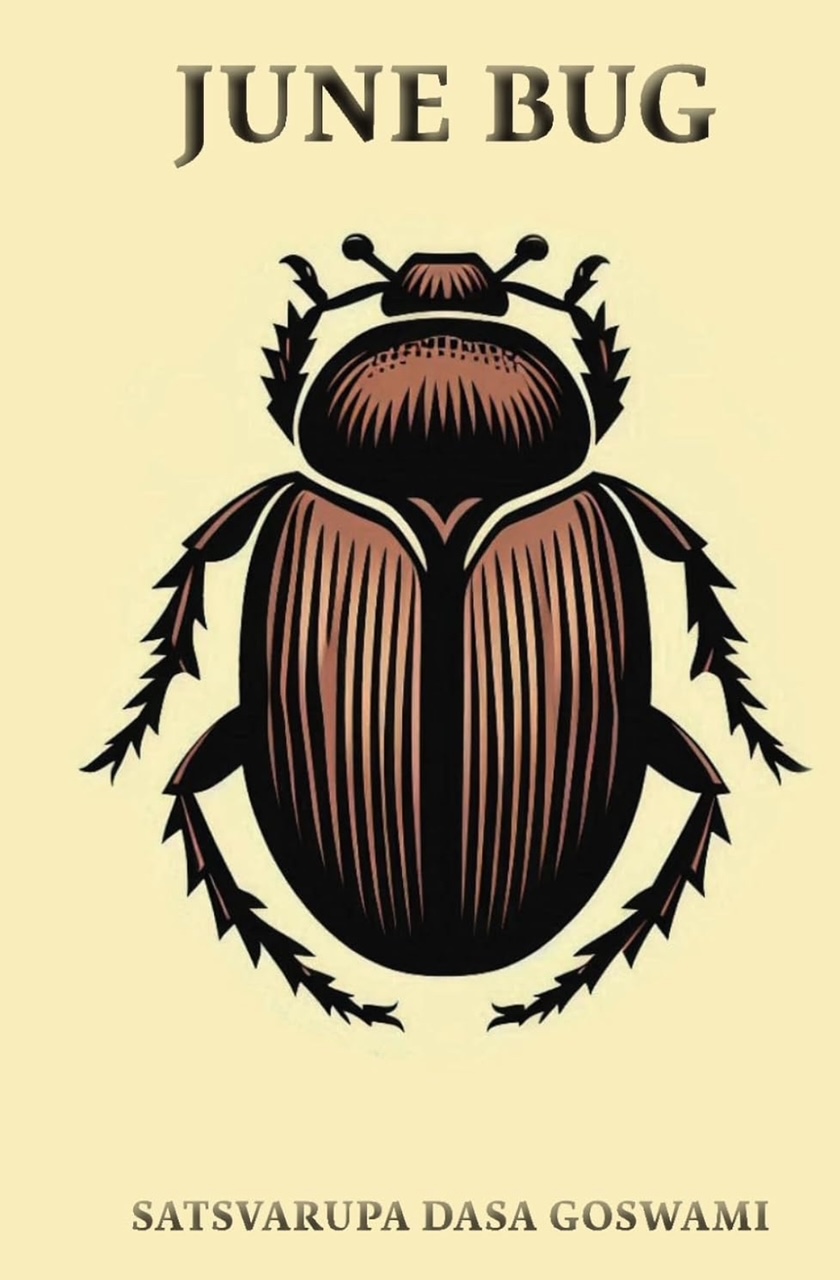
Readers will find, in the Appendix of this book, scans of a cover letter written by Satsvarūpa Mahārāja to the GN Press typist at the time, along with some of the original handwritten pages of June Bug. Together, these help to illustrate the process used by Mahārāja when writing his books during this period. These were timed books, in the sense that a distinct time period was allotted for the writing, during SDG’s travels as a visiting sannyāsī
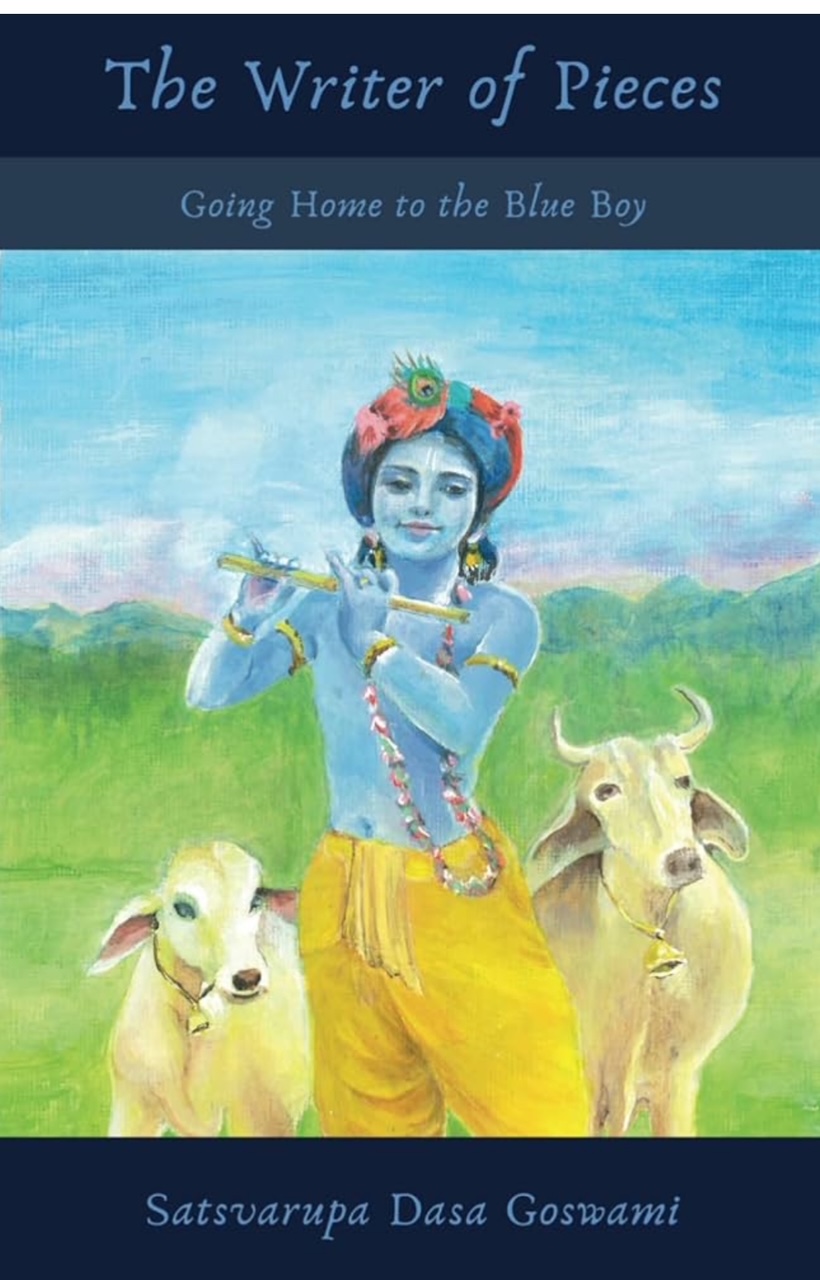
Don’t take my pieces away from me. I need them dearly. My pieces are my prayers to Kṛṣṇa. He wants me to have them, this is my way to love Him. Never take my pieces away.
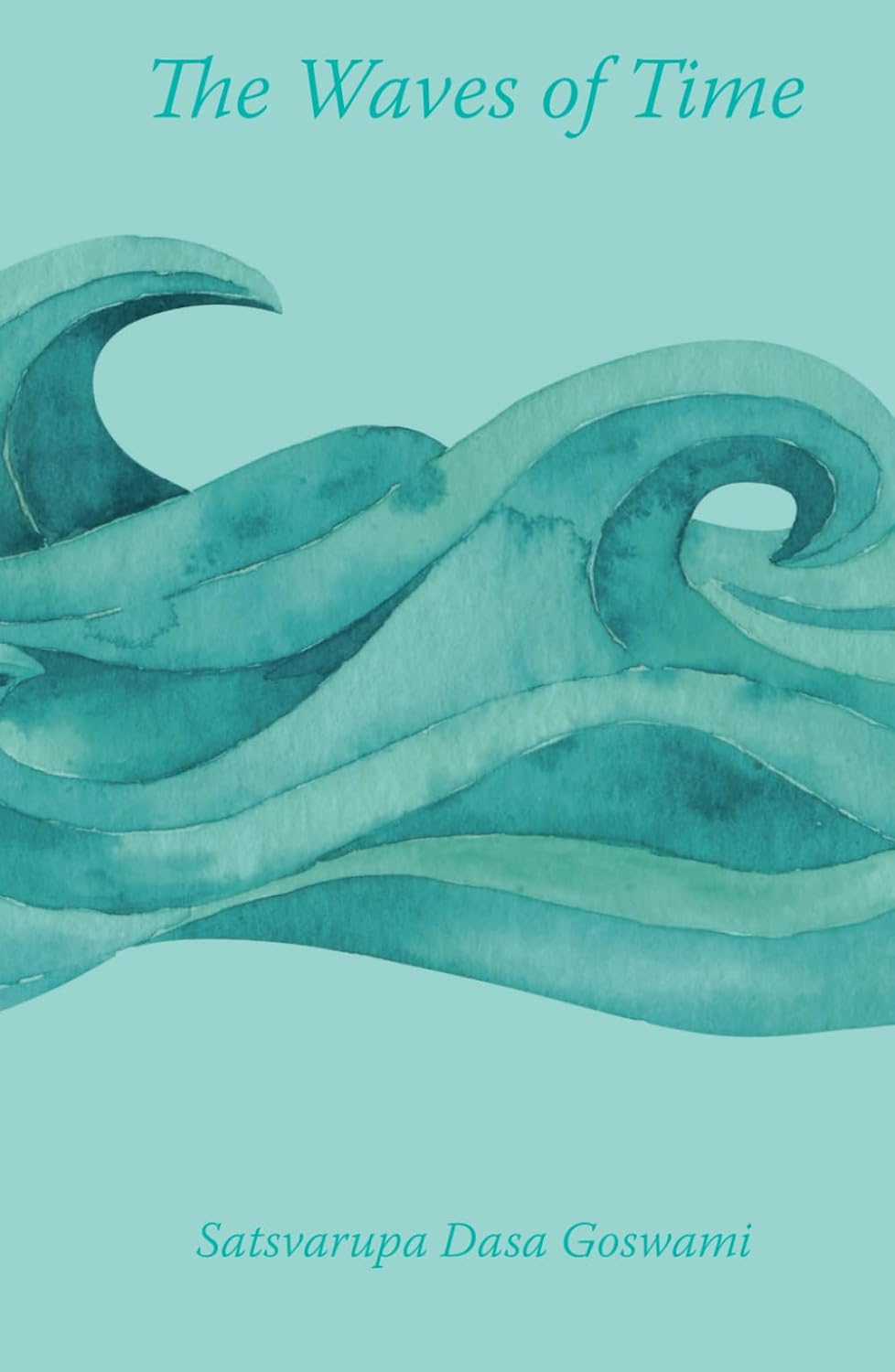
Many planks and sticks, unable to stay together, are carried away by the force of a river’s waves. Similarly, although we are intimately related with friends and family members, we are unable to stay together because of our varied past deeds and the waves of time.

To Śrīla Prabhupāda, who encouraged his devotees (including me) To write articles and books about Kṛṣṇa Consciousness.
I wrote him personally and asked if it was alright for his disciples to write books, Since he, our spiritual master, was already doing that. He wrote back and said that it was certainly alright For us to produce books.

I have a personal story to tell. It is a about a time (January–July 1974) I spent as a personal servant and secretary of my spiritual master, His Divine Grace A.C. Bhaktivedanta Swami Prabhupäda, founder-äcärya of the International Society for Krishna Consciousness. Although I have written extensively about Çréla Prabhupäda, I’ve hesitated to give this account, for fear it would expose me as a poor disciple. But now I’m going ahead, confident that the truth will purify both my readers and myself.

First published by The Gītā-nāgarī Press/GN Press in serialized form in the magazine Among Friends between 1996 and 2001, Best Use of a Bad Bargain is collected here for the first time in this new edition. This volume also contains essays written by Satsvarūpa dāsa Goswami for the occasional periodical, Hope This Meets You in Good Health, between 1994 and 2002, published by the ISKCON Health and Welfare Ministry.

This book has two purposes: to arouse our transcendental feelings of separation from a great personality, Śrīla Prabhupāda, and to encourage all sincere seekers of the Absolute Truth to go forward like an army under the banner of His Divine Grace A.C. Bhaktivedanta Swami Prabhupāda and the Kṛṣṇa consciousness movement.

A single volume collection of the Nimai novels.

Śrīla Prabhupāda was in the disciplic succession from the Brahmā-Mādhva-Gauḍīya sampradāya, the Vaiṣṇavas who advocate pure devotion to God and who understand Kṛṣṇa as the Supreme Personality of Godhead. He always described himself as simply a messenger who carried the paramparā teachings of his spiritual master and Lord Kṛṣṇa.

Dear Srila Prabhupada,
Please accept this or it’s worse than useless.
You have given me spiritual life
and so my time is yours.
You want me to be happy in Krishna consciousness
You want me to spread Krishna consciousness,

This collection of Satsvarūpa dāsa Goswami’s writings is comprised of essays that were originally published in Back to Godhead magazine between 1966 and 1978, and compiled in 1979 by Gita Nagari Press as the volume A Handbook for Kṛṣṇa Consciousness.

This second volume of Satsvarūpa dāsa Goswami’s Back to Godhead essays encompasses the last 11 years of his 20-year tenure as Editor-in-Chief of Back to Godhead magazine. The essays in this book consist mostly of SDG’s ‘Notes from the Editor’ column, which was typically featured towards the end of each issue starting in 1978 and running until Mahārāja retired from his duties as editor in 1989.

This collection of Satsvarupa dasa Goswami’s writings is comprised of essays that were originally published in Back to Godhead magazine between 1991 and 2002, picking up where Volume 2 leaves off. The volume is supplemented by essays about devotional service from issues of Satsvarupa dasa Goswami’s magazine, Among Friends, published in the 1990s.

“This is a different kind of book, written in my old age, observing Kṛṣṇa consciousness and assessing myself. I believe it fits under the category of ‘Literature in pursuance of the Vedic version.’ It is autobiography, from a Western-raised man, who has been transformed into a devotee of Kṛṣṇa by Śrīla Prabhupāda.”
 The Best I Could Do
The Best I Could DoI want to study this evolution of my art, my writing. I want to see what changed from the book In Search of the Grand Metaphor to the next book, The Last Days of the Year.
 a Hare Krishna Man
a Hare Krishna ManIt’s world enlightenment day
And devotees are giving out books
By milk of kindness, read one page
And your life can become perfect.
 Calling Out to Srila Prabhupada: Poems and Prayers
Calling Out to Srila Prabhupada: Poems and PrayersO Prabhupāda, whose purports are wonderfully clear, having been gathered from what was taught by the previous ācāryas and made all new; O Prabhupāda, who is always sober to expose the material illusion and blissful in knowledge of Kṛṣṇa, may we carefully read your Bhaktivedanta purports.

I use free-writing in my devotional service as part of my sādhana. It is a way for me to enter those realms of myself where only honesty matters; free-writing enables me to reach deeper levels of realization by my repeated attempt to “tell the truth quickly.” Free-writing takes me past polished prose. It takes me past literary effect. It takes me past the need to present something and allows me to just get down and say it. From the viewpoint of a writer, this dropping of all pretense is desirable.
 Geaglum Free Write
Geaglum Free WriteThis edition of Satsvarūpa dāsa Goswami’s 1996 timed book, Geaglum Free Write Diary, is published as part of a legacy project to restore Satsvarūpa Mahārāja’s writings to ‘in print’ status and make them globally available for current and future readers.